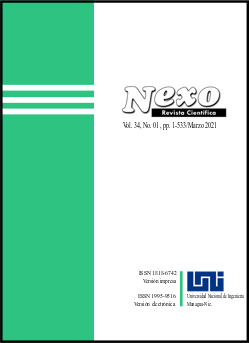Synthesis of an organic metal nanoporous structure for controlled azathioprine delivery
DOI:
https://doi.org/10.5377/nexo.v34i01.11290Keywords:
MOF, Nanoporous structure, MNPs, Drug release, AzathioprineAbstract
New drug delivery systems are highly efficient in diseases diagnosis and treatment and also controlled release of drugs. The use of this technology has given rise to the invention of new porous nanoparticles which are called metal organic frameworks (MOFs). In the present research, a kind of MOFs with formula Cu3(BTC)2 (HKUST-1, BTC ¼ benzene-1,3,5-tricarboxylate) with Fe3O4 magnetic nanoparticles (MNPs) as a core have been able to create three-dimensional magnetic porous structures. This magnetic and porous structure and the pores capability in being controlled have made these frameworks to be used as one of the best carriers in drug delivery. This system could magnetically be directed to the considered point inside body if it contains a drug that has side effects and may harm other body organs. Azathioprine is used in rheumatoid arthritis, granulomatosis with polyangiitis, Crohn's disease, ulcerative colitis, systemic lupus erythematosus, and in kidney transplants to prevent rejection. However, in the present work we consider the drug injection for kidney transplants to prevent rejection.
Downloads
1847
Downloads
Published
How to Cite
Issue
Section
License
The authors who publish in Nexo Scientific Journal agree to the following terms:
- Authors retain the copyright and grant the journal the right of the first publication under the license Creative Commons Attribution License, which allows others to share the work with a recognition of the authorship of the work and the initial publication in Nexo Scientific Journal.
- Authors may separately establish additional agreements for the non-exclusive distribution of the version of the work published in the journal (for example, in an institutional repository or a book), with the recognition of the initial publication in Nexo Scientific Journal.
- Authors are allowed and encouraged to disseminate their works electronically (for example, in institutional repositories or in their own website) before and during the submission process, as it can lead to productive exchanges, as well as earlier and greater citation of published works.










